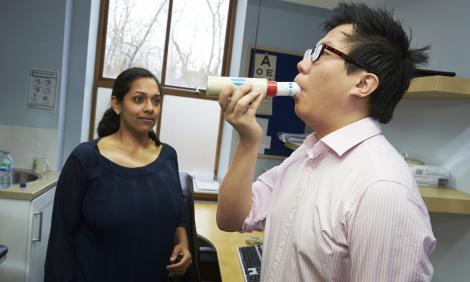Real-life stories - work experience
Find some real-life stories below written by current doctors about their work experience.

Lizzie Cottrell, NIHR Academic Clinical Fellow and 3rd year GP Specialty Trainee says:
“I undertook a range of work-experience prior to going to medical school including a week’s experience at the local community hospital, through school, where I shadowed a number of different doctors and nurses, weekly work experience with a local GP over a number of months and volunteering at a community hospital, speaking to the older patients who were on the ward a long time. I also gained experience of the hospital environment through paid work as a hospital domestic at the weekends from the age of 16 years old, making teas and cleaning the ward.
All of this experience was useful, but I would definitely recommend that students do not just shadow a consultant or GP prior to attending medical school, but also do some work experience that lets you really get chance to talk to patients.
I think that the risk of only shadowing senior doctors is that you observe what life may be life a long way down the track and, even then, they do not make you sit through them doing administration and management jobs so you do not get an accurate picture. If you find you don’t like talking to patients and/or find this very difficult, then you need to think twice about a career in medicine so using work experience to clarify this, I would say, would be the most valuable experience you could get.
Of all the experience I got, my paid job as a domestic was the best for exposing me to the sights and sounds of a medical environment (many not pleasant!) and gave me plenty of opportunity to learn how to gain rapport with patients.”
Click on the sections below for more real-life stories about work experience
-
"Hospitals are a good way of getting a wide variety of experiences, but you need to apply early, as spaces can be limited. Either phone to get the contact you need, or check the internet as often there are application forms available online. Don’t expect them to get back to you quickly, and apply to more than one. I couldn’t get a space in the hospital so instead I joined their voluntary team, which allowed me to meet lots of doctors, and while talking to them I managed to secure shadowing with a couple of consultants, including going into surgery.
I also managed to get work in an intermediate care home, and so got to see the gritty, less glamorous side of medicine, as well as working with GPs so I could experience both sides of medicine. My advice is if you want to spend time with certain specialists there is no harm in phoning the secretaries to see if they would be willing to let you.
Whatever placement you manage to secure though, make the most of it, think of questions to ask the doctors. This way you will have plenty to discuss in both your personal statement and in your interview."
-
"My work experience began in Year 10 when I had a week of experience in a care home for adults with learning/developmental difficulties. I also volunteered at a sports club for disabled children weekly and completed a qualification in disabled sports coaching.
When I started sixth form I volunteered as a tea lady at the local hospital. I also attended the MEDSIM course at Nottingham University (approximately £200).
In terms of showing leadership skills etc I was a member of the debate committee, an adult leader at the local Guide unit and I worked part-time."
-
"I was fortunate enough to be able to shadow an orthopaedic surgeon for one week, and a GP for a second. The two experiences - arguably at opposite ends of the clinical spectrum - really made me realise that medicine is not as glamourous as it is sometimes portrayed in popular culture. Despite these experiences being challenging, they enabled me to speak with a realistic perspective during my interviews, and also were an important part of my decision making process. The work experience also enabled me to probe current junior doctors' experiences in the NHS in the face of massive change. Once again, despite being a somewhat disconcerting process, it enabled me to demonstrate that I understood the challenges facing the NHS and doctors' training when I attended my interviews"
-
"As a sixth form student I was fortunate enough to have several areas of work experience to talk about in my medical school interview.
I spent a week with a rural GP practice in Somerset, where I learned some important basics about common medical conditions, and gained some knowledge on the structure of the NHS and how GP surgeries are run as businesses. I also spent a week in a hospital in Nairobi. This was a really fascinating experience, and I was able to talk about the differences in healthcare between England and Kenya at my interview. Finally I worked in several part-time jobs before applying to university. Whilst not directly related to medicine, these were a good way of demonstrating responsibility.
My advice to anyone looking for a place as a medical student is to get some general experience of hospital or GP medicine, and to supplement this with something different, so that you stand out at your interview. Good luck!"




